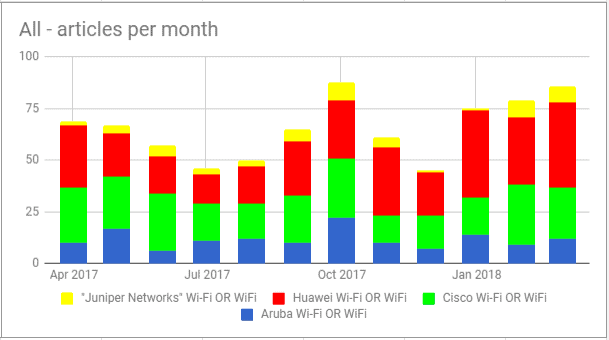
The top news in tech: the March digest
The headlines this month have been dominated by the Russian-Ukrainian war, and it would be remiss for me to not discuss the technological fallout from Russia’s invasion of Ukraine.
At the beginning of March, BBC cybersecurity correspondent Joe Tidy reported that Ukraine was fighting its first ‘hybrid war’. In case you aren’t familiar with the term, hybrid warfare blends conventional warfare with other means of attack; such as cyber and economic warfare – both of which have already had huge ramifications for the tech industry.
Ukraine has been the victim of several cyberattacks both leading up to and since the invasion. In response, tech companies Microsoft, Google, Meta, and Twitter have all stepped in to implement measures to help dampen the impact of Russia’s cyberattacks on Ukraine. The rest of the world has also become a target for cyberwarfare, as fears that Russia could retaliate against Western sanctions accelerate. US President Joe Biden has warned that cyberattacks on the US were imminent, and called on businesses to strengthen their digital defenses. While there has yet to be any large-scale attack as of yet, the BBC recently reported that Russia is believed to have hacked Viasat, a US satellite communications provider, on the day of its invasion of Ukraine. There has never been a more crucial time for cybersecurity firms to step up to the challenge.
Tech companies rapidly suspended their sales and services in Russia; including everything from fintechs, chipmakers, big tech giants, and video-game companies. Aside from the direct and immediate impact this is having on Russian citizens, the already depreciating consumer demand is also damaging profits for tech companies. A Nikkei report found that Apple intends to lower production orders of iPhones and AirPods by about 2-3 million units, due to lower demand for supply. While morally the correct approach, this is a trend we expect to see continue for all companies suspending their sales/services in Russia, and it is worrying the impact this will have on tech companies across the board.
Consumers worldwide will also be deeply affected as the war exacerbates supply chain disruption. The cost of raw materials is surging; including precious metals palladium, nickel, and lithium – all of which are core components in the automotive industry. Electric vehicle manufacturer Tesla has already been forced to increase its prices two times in the space of one week. The chip shortage has also intensified. As reported by Reuters, Ukraine’s two leading suppliers of neon (the key ingredient for making chips) have halted their operations. These suppliers produce around 50% of the world’s supply of neon, threatening to raise prices and further aggravate the semiconductor shortage.
One story of particular interest this month was in The Times, headlined Russia waives army call-ups to halt IT brain drain. For the past few years, Russia has been witnessing a so-called ‘brain drain’ of IT specialists – a trend that has seen a sharp uptick since the invasion. Statistics reveal that between 50,000 and 70,000 technology sector workers have already left the country, with a further 100,000 predicted to leave next month. In response, Russia is reported to have waived conscription for computer programmers, in a desperate effort to slow the mass exodus of skilled workers from the country. This has implications for the wider skills shortage crisis, one that has been exacerbated by the pandemic. With skilled Russian/Ukrainian IT workers fleeing their respective countries, regions with high demand for those skills may give them employment, to help alleviate the domestic skills shortage. While refugees are already travelling to safer countries that have good job prospects on an informal basis, we can expect formal worker visa schemes to be put in place to attract workers in need of employment.
Aside from the technological consequences of the war, there were a couple of other stories that caught my attention this month.
Government launches new body to make UK telecoms innovation leader
CityAM reported a big step up in the UK telecoms sector. A new body – the UK Telecoms Innovation Network (UKTIN) – launched to make the country “a world-leading centre for telecoms innovation”. This new body will support telecoms companies with their research and development, as well as provide operators and vendors the opportunity to collaborate on developing and improving technologies for networks.
This is exciting news for the UK telco industry! I hope that this new body will diversify the UK telecoms supply chain, increase market competition and spur innovation. It will be interesting to see the impact this new body has on open network technologies like OpenRAN, as well as the roll-out of 5G and the development of 6G over the coming decade. It is indeed a great time for telcos, and at Babel, this is one of our specialty areas. We have a wealth of experience helping telecoms vendors and software providers get their message out in the media, and supporting them at the biggest trade show of the year – MWC. If you are interested in hearing how we can help you, do get in touch.
Europe agrees new law to curb Big Tech dominance
European lawmakers have finally enacted legislation to curb the market dominance of big tech giants and give people more choice within their digital experience. Under the EU’s new Digital Markets Act (DMA), companies such as Google and Apple must now open up their services and platforms to other businesses. What does this look like? Google, for example, will now have to offer those with Android phones alternatives to its search engine, the Google Maps app, or its Chrome browser. Similarly, Apple would also be forced to allow iPhone users to uninstall its Safari web browser and other company-imposed apps that users cannot currently delete.
The announcement is the biggest regulatory move yet from the EU to act against anti-trust or anti-competitive behaviour from big technology companies. This legislation is a long time coming: big technology businesses have had two decades of virtually unchecked growth, and they have long faced criticism that they use their market dominance to impede competition. Over the last several years, the EU has been particularly ardent in sanctioning these companies, launching many anti-trust legal pursuits to reign in their power. These companies have a track record of thwarting attempts to curb their gatekeeping and monopolistic behaviour, so how much impact the DMA will have remains to be seen.





